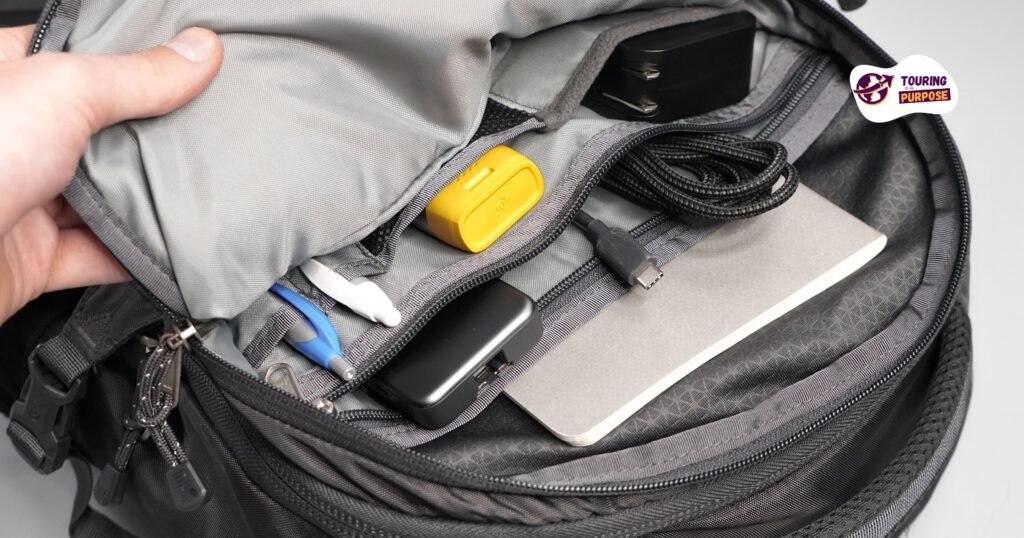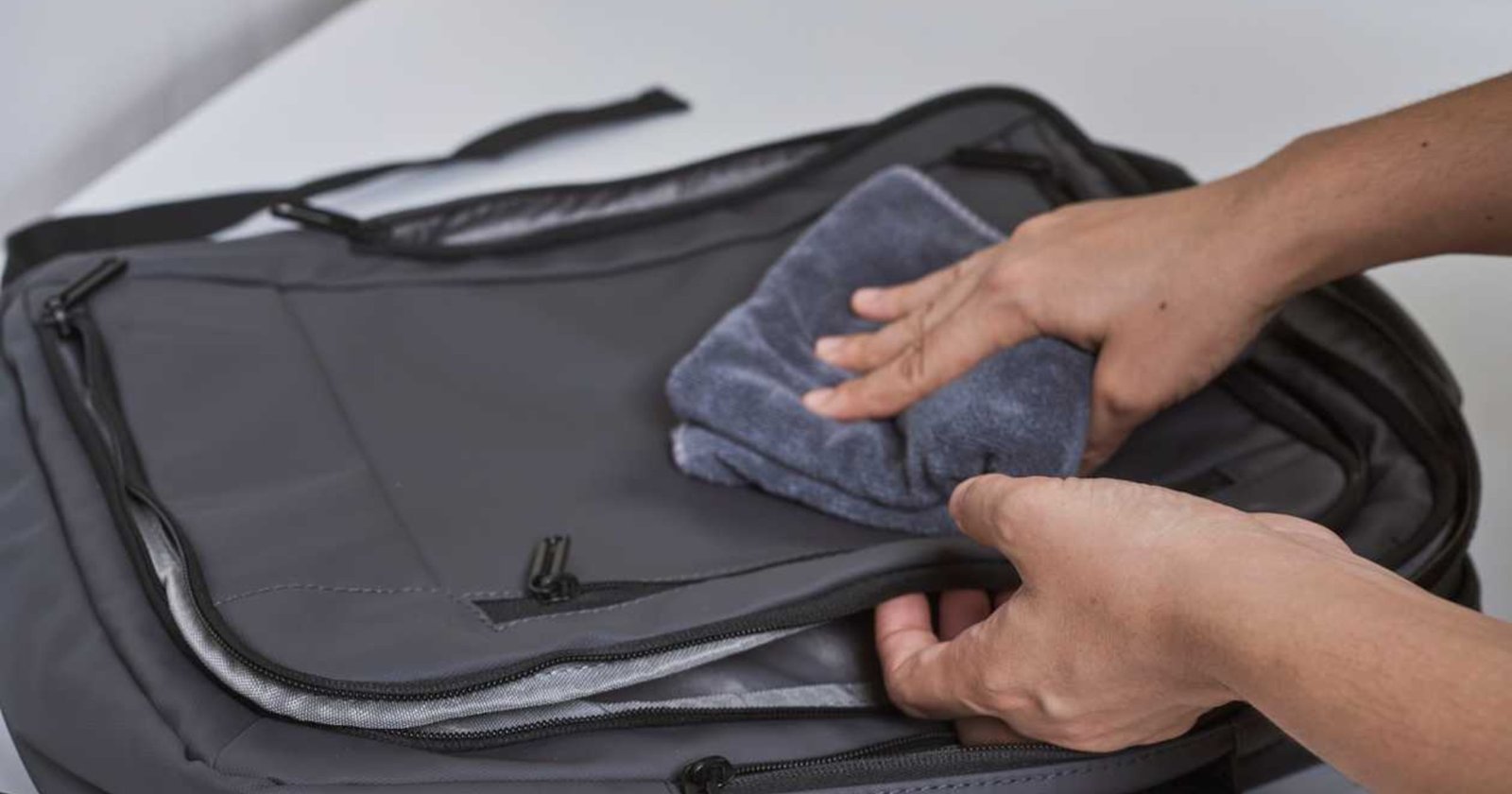Fill the tank or bathtub with lukewarm water and immerse the North Face backpack in it. A thorough soaking without the use of detergent should suffice to remove all the dirt. Ensure that each compartment is fully exposed during the immersion process.
Cleaning your North Face backpack requires care to maintain its durability and functionality. Start by emptying all the pockets and shaking the backpack upside down to remove any debris. Brush off any loose dirt or dust using a soft-bristled brush.
For persistent stains, prepare a solution of warm water mixed with a gentle detergent. Avoid bleach or harsh cleaners, as they can damage the fabric. Using a soft cloth or sponge to clean a North Face backpack, dab the solution onto the stained areas. Be sure not to submerge your backpack in water, as this can damage the internal padding and protective coatings. Rinse with a cloth dampened with clean water and leave your backpack to air dry, away from direct sunlight. Regular maintenance keeps your North Face backpack clean and ready for any adventure.
The Importance of a Clean Backpack
Maintaining a clean backpack is not just about aesthetics—it directly impacts the longevity of the product and your health.
Dirt and grime can gradually degrade the fibers of the fabric, leading to tears and a reduction in the backpack’s overall durability. Moreover, a dirty backpack can become a breeding ground for bacteria and mold; how to clean a North Face backpack potentially leads to unpleasant odors and even health risks.
Regular cleaning prevents these issues, ensuring your backpack continues to serve you effectively and safely on your adventures.
Introduction
A North Face backpack is a sturdy, reliable companion for your outdoor adventures, be it hiking, camping, or daily commuting.
However, regular use exposes it to dirt, sweat, how to clean a North Face backpack, and occasional spills. Understanding how to clean and maintain your backpack properly can extend its lifespan and ensure it stays in top shape.
This guide will walk you through the process of cleaning a North Face backpack, emphasizing the importance of regular cleaning and offering useful tips to prevent damage during the cleaning process.

Materials and Tools Needed
- Gentle Detergent: Recommend using a mild, non-abrasive detergent to clean your backpack.
- Soft-Bristled Brush: Suggest a soft-bristled brush for scrubbing.
- Microfiber Cloth: Explain the benefits of a microfiber cloth for gentle wiping.
- Sink or Basin: You’ll need a sink or basin large enough to submerge your backpack.
Preparation: Emptying the Backpack
- Remove Contents: Advice removing all items from your backpack, including pockets and compartments.
- Check Pockets: Double-check pockets for any small items or forgotten essentials.
- Empty Hydration Bladder: If your backpack has a hydration bladder, ensure it’s emptied and cleaned separately.
Surface Cleaning: Removing Loose Dirt
- Shake It Out: Give your backpack a good shake to dislodge loose dirt and debris.
- Brushing: Gently brush the exterior of the backpack to remove surface dirt.

Interior Cleaning: The Main Compartment
- Zipper Closure: Open the main compartment’s zipper fully to provide better access for cleaning.
- Shake and Vacuum: Turn the bag inside out, shake it, and use a vacuum cleaner with a brush attachment to remove loose dirt.
- Wipe Down: Dampen a microfiber cloth with water and gently wipe down the interior.
- Let It Dry: Allow the interior to air dry fully before moving on to deeper cleaning.
Deep Cleaning: Washing the Backpack
- Fill the Sink or Basin: Fill a clean sink or basin with lukewarm water.
- Add Detergent: Add a small amount of mild detergent to the water and mix it thoroughly.
- Submerge the Backpack: Carefully submerge your backpack in the soapy water.
- Agitate: Gently agitate the water to help dislodge dirt and grime.
- Scrubbing: Use a soft-bristled brush to scrub the exterior, paying extra attention to soiled areas.
- Interior Cleaning: Repeat the scrubbing process for the interior, focusing on stains or odors.
- Rinse Thoroughly: Empty the soapy water, and rinse the backpack under running water until all detergent is removed.
- Squeeze Excess Water: Gently squeeze out excess water, but do not wring or twist the fabric.
Drying Your Backpack
- Air Drying: Hang your backpack in a well-ventilated area with enough space for proper airflow.
- Avoid Direct Sunlight: Keep the backpack out of direct sunlight to prevent fading and damage to materials.
- Stuff It: Stuff your backpack with towels or crumpled paper to help it maintain its shape while drying.
- Hydration Bladder: If your backpack has a hydration bladder, ensure it’s dried separately to prevent mold growth.
Cleaning Straps and Zippers
- Straps: Wipe down straps with a damp cloth, but avoid submerging them in water.
- Zippers: Clean zippers with a soft brush and use a zipper lubricant to keep them running smoothly.
Special Care: Waterproofing and Stain Removal
- Waterproofing: Consider reapplying a waterproofing spray after cleaning to restore water resistance.
- Stain Removal: For stubborn stains, consider a fabric-specific stain remover, following the manufacturer’s instructions.
Storage After Cleaning
- Properly Dry: Ensure your backpack is completely dry before storing it to prevent mildew or odors.
- Avoid Compressing: Store your backpack in a cool, dry place without compressing it to maintain its shape.
Conclusion
Recap Key Takeaways: Summarize the key points, underlining the importance of regular cleaning and proper care for your North Face backpack. Empowerment: Conclude by empowering readers to take action, ensuring their backpack stays clean and ready for future adventures. How to Clean a North Face Backpack? A clean North Face backpack is not only a reflection of good hygiene but also an investment in its longevity and functionality. By following these steps and making cleaning a routine part of your post-adventure regimen, to clean a North Face backpack, your backpack will stay in excellent condition and ready to accompany you on countless journeys ahead.
FAQs
Can you put a North Face backpack in the wash?
While it might seem convenient to toss your North Face backpack in the wash, it’s not recommended. Washing machines can be harsh and potentially damage the bag’s fabric; how to clean a North Face backpack, zippers, and straps? Instead, opt for hand cleaning with mild soap and warm water to ensure the longevity and integrity of your backpack.
How do you deep clean a North Face backpack?
To deep clean a North Face backpack, first empty and vacuum the inside. Then, using a sponge, gently scrub the entire bag with warm water and mild detergent. Particularly, soiled spots might require a soft-bristled brush. Rinse thoroughly to remove all soap residue and air dry, preferably out of direct sunlight. Remember, never use bleach or harsh cleaning agents, as they can damage the backpack’s material.
How can I clean my North Face?
To clean your North Face apparel, first, check the garment’s care label for specific instructions. Most items can be machine-washed in cool water with a mild detergent. Air dry or tumble dry on low heat. Avoid ironing or dry cleaning, as this can damage the material. For spot cleaning, how to clean a north face backpack, use a soft cloth with water and mild soap. Always remember proper care enhances the longevity of your North Face gear.
How do you wash a backpack without ruining it?
To wash a backpack without ruining it, first, empty the bag completely. Use a vacuum to get rid of dust and crumbs. Hand wash it gently using a soft sponge; how to clean a North Face backpack with warm water and mild detergent. Scrub all the pockets and compartments. Rinse thoroughly and let it air dry, preferably out of direct sunlight. Avoid using washing machines, harsh detergents, and bleach, as they can damage the material. Remember, always follow the bag’s care instructions.

